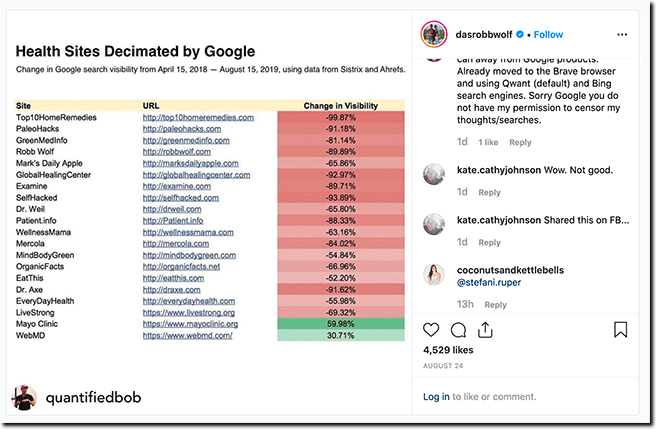There have been whisperings over the past several months, actually more than just whisperings, that “Big Tech” (most accounts name Google as the principle player given their dominance in search technology) have been manipulating search data results in a way that downgrades “alternative or non-mainstream” health and wellness information.

Mark Sisson actually wrote about it in his weekly missive this past weekend (quoted in part below), and posted the image above borrowed from Robb Wolf’s IG account –
In other words, so-called “alternative” health websites—ones that offer substantive counterpoints to the conventional wisdom regarding diet, health, and wellness—have taken a massive hit on their visibility in Google search, while the ones peddling the conventional lines of advice have seen a huge increase in their visibility. Since Google is the world’s largest search engine by far, so much so that “to google” means to search for something on the Internet, this has inevitably reduced our search (and overall) traffic.
Some of this is due to Google weighting their algorithms toward “expert” advice, toward opinions and articles written by people with MDs and PhDs after their names. I’ve tried to overcome this by changing the way I cite research. I’ve always cited and linked to tons of medical studies, far more than the “experts” like Mayo Clinic and WebMD ever have, but now I’m actually listing a “References” section with those proper citations in the proper academic format. You’ve probably noticed. It’s helped a bit, but the drop-off has been larger than this can account for.
In my opinion, this development just means that people like me and Robb are over the target. We’re a threat, and institutions are worried. We’ve already had a huge effect on the way people eat, live and exercise. Grandmas are going keto. Grandpas are doing CrossFit. Your kid’s school teacher is IFing. Large multinational food corporations are buying boutique avocado oil-based mayo brands for large sums of money. It’s an interesting time. Conventional institutions are feeling the heat, and this might be one way to try to stem the tide.
Does Big Tech Really Manipulate Health Search Data? Say It Ain’t So, Joe
I have to admit, I actually chuckled a bit when I first read Sisson’s weekly email.
Big Tech has been censoring and manipulating search results for years, often targeting groups over political and religious ideology, despite being castigated over and over again for it, and even hauled before Congress on multiple occasions with the requisite harrumphing and handwringing testimony broadcast on C-Span.
If you don’t believe that’s been happening for years now, I have some swamp land in southern Arizona you’d probably be interested in buying.
The bigger question, at least from where I sit as a classically trained physician having fairly recently “defected” to the ancestral health world, is why the push now to filter and downgrade access to what a bank of Google engineers appears to view as “alternative” health information?
While I’m not one prone to run to conspiracy theories to explain strange things observed in today’s world, I’m with Sisson on this one. The alternative health world, driven largely by the evolving science related to ancestrally-oriented nutrition and practically oriented, functionally-driven fitness approaches, is beginning to turn what has been conventional medical wisdom on its collective ear in some areas, and the powers at be are getting itchy – and defensive.
There are a number of issues to consider here, one critical point being this – there are some charlatans and wackadoos peddling nonsense in the ancestral and alternative health worlds (just as there are ensconced in the conventional health provider arena); with a bit of digging, they’re pretty easy to identify, and are most often shrouded in a mist of anecdotal spiels versus anchored to objective science. Big Tech will likely argue they’re “protecting the masses” from these agents by censoring results, though of course they’re throwing the baby out with the bathwater.
Good science is going to win the day here, and I’m convinced we’re going to see long-standing thinking about nutrition turned on its collective ear more and more each year; the Virta study is doing that right now in terms of carbohydrates and T2DM, and the lipid wars are picking up impressive steam month by month.
More than ever, caveat emptor in terms of the information you read. Trust, but verify. Read widely, and ask questions – about everything. These are indeed very interesting times…



Leave a Reply